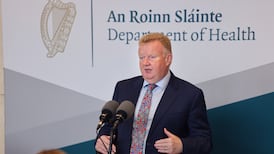1) The Irish Blood Transfusion Service is asking blood donors to make an extra effort to give blood in the next few weeks. Following necessary closures of clinics during Storm Emma, the service has reduced blood stocks. With St Patrick's Day and Easter approaching, there is a special need to build up blood for regular services to Irish hospitals. See giveblood.ie for times and venues of blood donor clinics.
2) World Glaucoma Week, which continues until March 17th, aims to raise awareness of this form of preventable blindness. Glaucoma is the name for a group of eye conditions in which the optic nerve is damaged at the point where it leaves the eye. This nerve carries information from the light-sensitive layer in your eye, the retina, to the brain where it is perceived as a picture. The Irish College of Opthalmologists says that early detection is key to slowing progression of glaucoma and that regular eye tests are the only way to detect "symptomless" glaucoma early. At a late stage, glaucoma is irreversible and results in sight loss and blindness. See eyedoctors.ie
3) Terminally ill workers should be granted a protected employment status under EU law, similar to pregnant workers, in order to prevent unfair treatment or dismissal, according to Irish MEP Deirdre Clune. She was speaking at the launch of European Dying to Work Campaign at the European Parliament, Brussels, in March. "As it stands, there are no specific protections for terminally ill employees under EU law. The Dying to Work Campaign, which originated in the UK, notes with concern the cases of the unfair dismissal or treatment of terminally ill employees. We are calling for the introduction of EU legislation to safeguard of the rights of employees by identifying terminal illness as a protected characteristic. That could be achieved by providing such employees with a "protected" employment status under EU law, similar to that which is contained within the pregnant workers directive," said Clune.
4) The Ark children's cultural centre in Dublin's Temple Bar is hosting visual art workshops and Easter camps about architecture in March and April. The Me & the City workshops will encourage 2-12 year olds to plan, design and create models of their ideas to transform our cities. Working with architects and artists, 8-12 year olds will imagine and redesign a specific area of Dublin into a dedicated children's cultural quarter and create a 3-D model of it. And children who cannot make the workshops can still send in their ideas on what should be included in a children's cultural quarter. Submit ideas to arkly.ie/2oT1gHF or email your idea with your name, county you live in and your age to TheArkDublin@gmail.com on or before March 20th. Tickets for workshops/camps at ark.ie or (01) 670 7788.
5) Prof Alexandre Kalache, former director of the World Health Organisation's global Ageing and Life Course programme, is the keynote speaker at the Age Friendly Universities international conference, March 13th-14th, in Croke Park, Dublin. Organised by Dublin City University, the theme is Engaging Ageing, with an emphasis on research, policy and practice. See dcu.ie/agefriendly
6) Up to 2,000 people are expected to walk from Howth Harbour to Dún Laoghaire Harbour (or the other way) on St Patrick's Day for the 13th annual Harbour2Harbour Walk to raise funds for mental health organisation Aware. The 26km walk will take participants along the scenic Dublin Bay route with a "Halfway Hooley" hosted at the Dublin Port Company's newly-opened public plaza. Register for €25 on aware.ie/events.
7) Author and parenting coach Stella O'Malley will give a talk to parents and teenagers on positive body image on Tuesday, March 13th at 6.30pm in the Lexicon Library, Dún Laoghaire, Co Dublin. Her talk will look at how a poor body image can lead to self-consciousness and anxiety and how it is important to control our negative thoughts to have a better sense of self in both body and mind. Admission free.
sthompson@irishtimes.com








